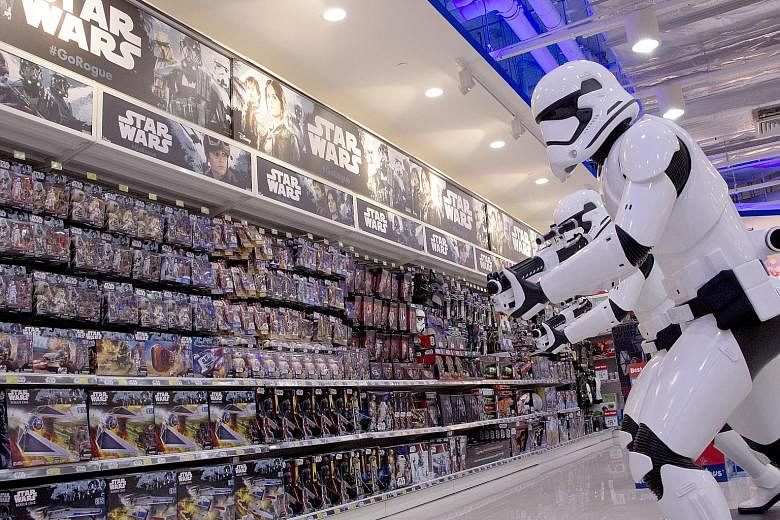Among the newest toys this Christmas is the Hatchimal, an "egg" that hatches into a colourful talking bird-like plushie that its owner can feed and nurture.
There is also the soft, owl-like Furby, which those who were kids in the late 1990s would remember. The rebooted version of the robotic toy now comes with its own mobile app.
As the festive season draws nearer, retailers are hoping that such toys will inject some joy into the gloomy shopping sector.
"We are very optimistic about the future of toys. We have been in Singapore for 32 years and based on our experience, toys tend to be a little more recession-proof when times are tough," Mr Andre Javes, president (Asia-Pacific) of American retailer Toys 'R' Us, told The Straits Times.
And he has reason to be cheery. According to market research firm Euromonitor International, sales of toys and games in Singapore are expected to hit $726.6 million this year, up 6.2 per cent from $683.9 million last year. Sales rose 7 per cent last year over 2014.
This is a bright spot for an otherwise lacklustre retail sector.
Retail sales, excluding motor vehicles, have fallen every month since February this year, with the latest government data estimating a fall of 1.9 per cent in September over the same period last year. Sales last year fell 1.2 per cent over 2014.
Toy sales, though still vulnerable to the slowing economy, seem less affected by factors such as competition from overseas online shops.
Parents still prefer to take their children to physical stores to pick out their toys, said Mr Javes.
Sales of action figures are also expected to get a boost from recent and upcoming movie releases such as Rogue One: A Star Wars Story, Fantastic Beasts And Where To Find Them and Marvel's Doctor Strange, said Mr Jun Huang Tan, a research analyst at Euromonitor. "Consumers who purchase action figures want to be connected to the movies and the interest in the movies encourages better sales," he said.
Department stores are counting on well-loved brands such as Lego to boost sales.
Robinsons, for instance, saw toy sales increase 21 per cent year-on-year during the Christmas period last year. In contrast, department store sales in general last year fell 1.4 per cent in December and rose a modest 1.3 per cent in November, compared to the same periods the year before.
Still, video games, which include paid mobile apps, make up the bulk - about two-thirds - of total toy and game sales here. They overtook sales of traditional toys and games here - such as action figures, dolls and remote control cars - in 2007.
But traditional toy and game purchases are still growing, Euromonitor figures showed.
Last year, traditional toy and game sales grew 3.2 per cent over 2014, while video game sales grew 9.2 per cent for the same period.
This could be because some parents are opting for games that encourage interaction and manufacturers are giving old-school toys, such as the Furby, a modern twist, retailers noted.
For instance, Shopkins, a range of grocery-themed toys, now allows owners to scan their toys into mobile apps to earn rewards as they play, noted Mr Erwin Oei, head of business analytics at Metro.
"The introduction of apps has helped to increase sales," he said.
Ms Susan Tay, director of The Better Toy Store, said that video games and mobile gaming apps hurt sales initially, but added that parents seem to be re-evaluating their children's exposure to such games.
"Studies have shown that young children may not benefit from play that is so exclusive of other people and the environment," she said.
Housewife Faith Tan, 39, who last month bought a PlayStation 4 (PS4) for her nine-year-old son, said the type of traditional toys he enjoys is limited to Nerf guns and Lego bricks. "Boys his age are more into iPads, the PS4 and electronic games. He gets bored easily. I do limit how long he plays with them though," said Madam Tan.
But childcare teacher Zhu Jia, 37, intends to buy either Lego or card games for her two sons, aged six and seven. "I don't allow them to play video games. They're not good for their eyes, and can be addictive and cause them to lose track of time," she said.


